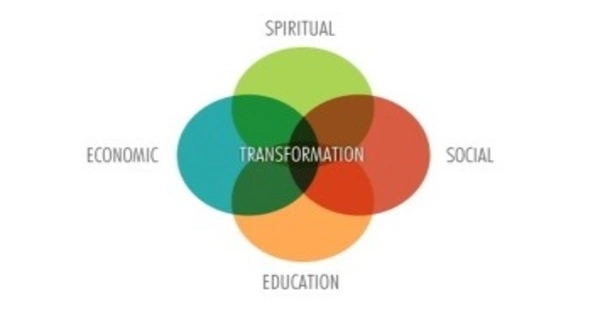Societal transformation refers to profound and long-term changes in a society’s structures, values, norms, and behaviors. It refers to “a deep and sustained, nonlinear systemic change” in a society in sociology. Economic, political, cultural, technological, and environmental changes can all occur at different levels. Transformational changes can occur within a specific system, such as a city, a transportation system, or an energy system.
Societal transformations are frequently driven by a combination of internal and external factors, and they can have far-reaching consequences for individuals, communities, and institutions. These can also refer to changes in an entire culture or civilization. Such transformations frequently include cultural, technological, political, economic, and environmental changes. Transformations can be seen as occurring over several centuries, such as the Neolithic Revolution, or at a rapid pace, such as the rapid expansion of megacities in China.
Whereas the term “social transformation” is commonly used in sociology to describe the process of change in an individual’s ascribed social status or in social structures such as institutional relationships, habits, norms, and values, “societal transformation” refers to a broader set of societal structural changes.
Several factors can contribute to societal transformation:
- Technological Advancements: Rapid development and adoption of new technologies has the potential to transform the way people live, work, and communicate. For example, the internet and smartphones have had a significant impact on societies all over the world.
- Economic Shifts: Economic system transitions, such as the shift from agrarian to industrial or industrial to information-based economies, can result in significant societal transformations. Globalization and economic power shifts can also play a role.
- Cultural Evolution: Changes in cultural values, beliefs, and practices can lead to societal transformation. This might include shifts in attitudes towards gender roles, diversity, or environmental consciousness.
- Political Changes: Transformations in political structures and ideologies can have a profound impact on societies. Shifts from authoritarianism to democracy, revolutions, and changes in governance structures can reshape the social fabric.
- Environmental Challenges: Environmental issues such as climate change, resource depletion, or ecological crises may spark societal transformations. These challenges may necessitate changes in how societies operate and interact with nature.
Societal transformation is a complicated and dynamic process that frequently involves the interaction of multiple factors. Furthermore, the outcomes of these transformations can be highly variable, with both positive and negative consequences. Adapting to and managing societal transformations necessitates careful planning, inclusivity, and a commitment to addressing any challenges that may arise.
















